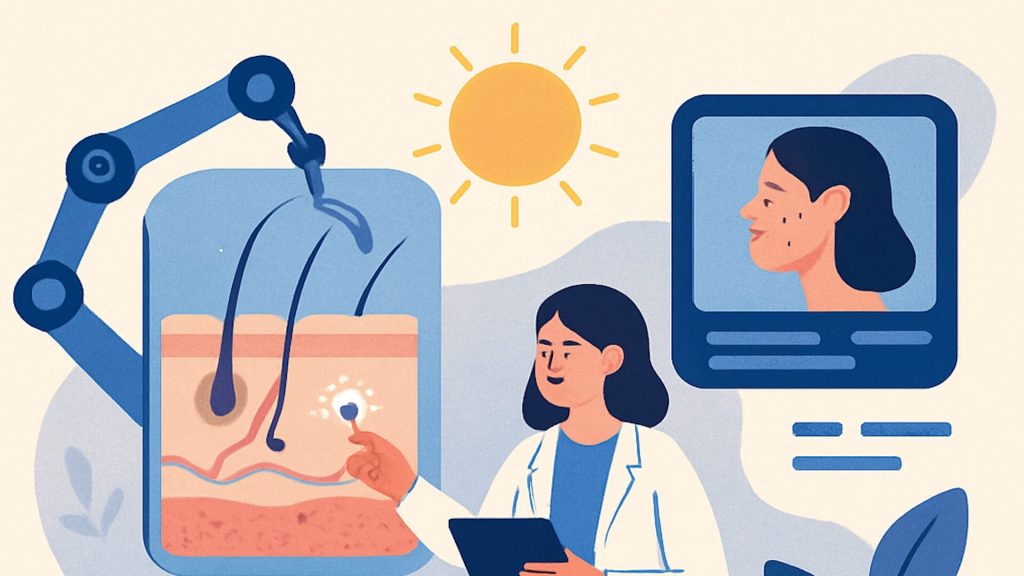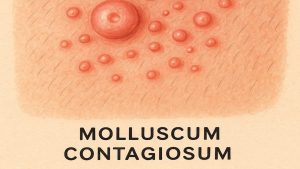- AI detects lesions with dermatologist-level accuracy
- Teledermatology improves access & reduces waiting times
- AI personalises treatments for genetic skin disorders
- Wearables enhance adherence through tailored skincare
- Conversational AI boosts acne education globally
Technological innovation is reshaping dermatology by combining artificial intelligence (AI), telemedicine, and personalised treatments to improve accessibility and precision in skincare. These advances strengthen diagnostic accuracy, streamline consultations, and empower patients to manage their skin health more effectively.
This article explores how AI and emerging technologies support early detection, enhance personalised dermatological care, and transform everyday skincare.

AI’s Transformative Role In Dermatology
AI is increasingly used to analyse skin images, helping identify abnormalities such as melanoma with sensitivity rates above 90%, comparable to dermatologist assessments [1]. Such precision supports earlier intervention and more efficient triage.
AI also enhances access to dermatology services in rural or underserved areas. Remote skin assessments can deliver timely guidance, reducing healthcare burdens. By 2023, global teledermatology platforms recorded more than one million consultations, demonstrating improved accessibility.
Monderma integrates these advances to offer tailored skincare through digital consultations, enabling users to receive professional guidance before starting treatment.
AI Skin Analysis: Precision & Early Detection
AI-powered image analysis uses deep learning to evaluate moles, rashes, and other skin changes. Sensitivity for detecting malignant lesions has been reported between 64.8% and 92% [2]. These systems complement clinical expertise by supporting decision-making and prioritising urgent cases.
AI skin analysis may also assist in managing conditions such as acne or rosacea, though its use for monitoring treatment progress remains under active research [8].
Platforms like Monderma allow users to begin their journey with a free online consultation, receiving tailored guidance for concerns like pigmentation or breakouts [3].
Online Skin Consultations: Accessibility & Engagement
Online consultations allow patients to connect with dermatology professionals from home. This reduces travel and can speed up assessment times. NHS data from 2022 reported significant reductions in waiting times for non-urgent dermatology cases through teleconsultation [3].
These services also improve continuity of care, allowing ongoing reviews and progress tracking. Monderma’s platform provides secure dashboards where users can monitor results and request adjustments following clinical review.
Genetic Skin Conditions & Personalised Approaches
AI has emerging applications in understanding and managing genetic skin disorders such as psoriasis and epidermolysis bullosa simplex. By analysing genetic data, AI identifies biomarkers and patterns that inform targeted care plans [4].
This enables more individualised regimens, potentially reducing flare-ups and improving quality of life. Such approaches reflect the move toward evidence-based, precision dermatology.
AI In Healthcare Roles & Professional Collaboration
AI enhances, rather than replaces, the role of healthcare professionals. Dermatologists use AI tools to support diagnostic accuracy and workflow efficiency. In 2025, NICE issued an early value assessment recognising AI’s potential for triaging skin lesions in suspected cancer referrals [5].
This partnership allows clinicians to focus on complex cases while integrating AI for early detection and data analysis.
AI is also transforming dermatology training, enabling practitioners to allocate more time to patient communication and long-term care strategies.
Future Innovations In Dermatology
Technological developments continue to drive progress in skin health monitoring and treatment.
Wearable Devices & Skin Monitoring
Wearable technology tracks physiological changes and hydration, offering real-time insights for conditions like atopic dermatitis [7]. Continuous monitoring supports early intervention and long-term management.
AI-Powered Dermatological Products
AI-driven skincare systems assess user data to recommend personalised ingredients or formulations. While adherence improvements vary, personalised digital skincare has been shown to enhance engagement and satisfaction [7].
AI also streamlines product formulation by analysing ingredient safety and compatibility, accelerating the creation of new dermatological products.
Conversational AI & Patient Education
Chatbots and virtual assistants now assist in dermatology education, providing evidence-based responses to common questions. These systems can help users understand acne, eczema, or pigmentation management in real time [6].
Early findings suggest conversational AI improves patient understanding by up to 35% in certain dermatology education studies, though further evaluation is ongoing.
Historical Context & Future Directions
From early herbal remedies to modern AI-enhanced dermatology, skin care has continuously evolved. Combining traditional knowledge with advanced analytics fosters more holistic and sustainable care models.
AI’s predictive capacity could enable earlier identification of risk factors, aligning with the broader move toward preventive and personalised medicine.
Monderma: Personalised Skincare Solutions
Monderma provides prescription-based, dermatologist-reviewed formulations for skin concerns such as acne, ageing, pigmentation, and rosacea. Treatments are personalised following an online consultation with ongoing professional support.
This process reflects the direction of modern dermatology: precise, accessible, and scientifically supported skincare.
Conclusion
AI and digital innovation are redefining dermatology by improving access, precision, and patient engagement. From advanced image analysis to wearable devices, technology enables proactive and personalised care.
Platforms like Monderma are leading this transformation, offering prescription skincare designed to complement professional guidance. Explore your personalised options through a free online consultation with a GPhC-registered prescriber.
Content is for informational purposes only. Monderma treatments are prescribed following consultation. Results and timeframes can vary. Use as directed by your prescriber.
Bibliography
- Esteva A, Kuprel B, Novoa RA, et al. Dermatologist-level classification of skin cancer with deep neural networks. Nature. 2017;542(7639):115-118.
- Han SS, Kim MS, Lim W, Park GH, Park I, Chang SE. Augmented Intelligence Dermatology: Deep Neural Networks Empower Medical Professionals in Diagnosing Skin Cancer and Predicting Treatment Options for 134 Skin Disorders. Journal of Investigative Dermatology.
- NHS England. A teledermatology roadmap: implementing safe and effective teledermatology triage pathways and processes. 2023.
- Smith P, Johnson CE, Haran K, et al. Advancing Psoriasis Care through Artificial Intelligence. Curr Dermatol Rep. 2024.
- National Institute for Health and Care Excellence (NICE). Artificial intelligence (AI) technologies for assessing and triaging skin lesions referred to the urgent suspected skin cancer pathway: early value assessment. NICE HTE24. 2025.
- Kong JD, Kim J, Kim S, et al. The Comparative Sufficiency of ChatGPT, Google Bard, and Bing AI in Answering Diagnosis, Treatment, and Prognosis Questions About Common Dermatological Diagnoses. JMIR Dermatol. 2024;7:e60827.
- PubMed. Skin sensing and wearable technology as tools to measure atopic dermatitis. 2024.
- How Well Can AI Diagnose and Monitor Acne? Dermatology Times. Published June 1, 2022. Accessed July 8, 2025.
Find your perfect skincare formula
Takes less than 2 minutes – see what your skin needs
Get Custom Formula













